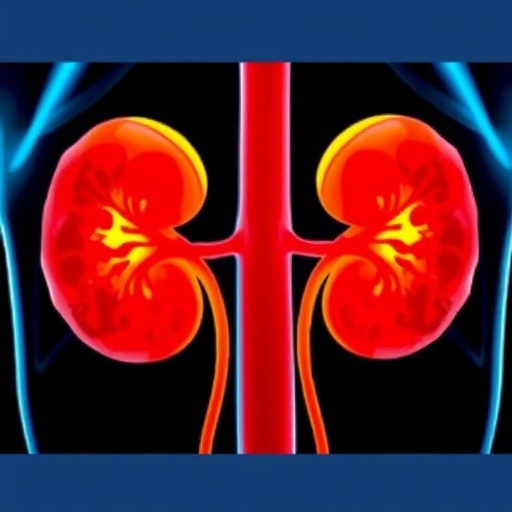In recent groundbreaking research, scientists have unearthed a compelling link between serum uric acid (SUA) levels and survival outcomes in patients battling metastatic renal cell carcinoma (mRCC) under targeted therapy. Renal cell carcinoma, a notoriously aggressive form of kidney cancer, poses significant challenges for oncologists due to its tendency to metastasize and its resistance to conventional treatments. This new study offers valuable insight into how a biochemical marker, serum uric acid, which is the final oxidation product of purine metabolism, might serve as a prognostic indicator in this daunting clinical scenario.
Serum uric acid has long been studied primarily within the context of gout and kidney disease, yet its role in cancer biology has remained elusive until recent years. As a molecule heavily involved in purine metabolism, SUA can exert dual roles, both potentially protective via its antioxidant properties and harmful due to its pro-inflammatory effects. Interestingly, elevated uric acid levels have been associated with poorer outcomes in various malignancies, prompting researchers to examine this relationship specifically in metastatic renal cancer, where robust prognostic tools are critically needed.
The study in question involved a cohort of 290 patients with metastatic renal cell carcinoma, all undergoing targeted therapy—a treatment paradigm that includes tyrosine kinase inhibitors and other agents tailored to interfere with cancer-specific molecular pathways. Researchers pinpointed an optimal SUA threshold of 5.8 mg/dL through receiver operating characteristic curve analysis to stratify patients into high and low SUA groups, thereby enabling a nuanced comparison of survival outcomes.
Using the Kaplan-Meier method, a statistical approach commonly employed in survival analysis, the investigators found remarkable differences in progression-free survival (PFS) and overall survival (OS) between the two groups. The low-SUA cohort experienced superior PFS and OS, with median times of 16.2 months and 92 months respectively, in stark contrast to 8.8 months and 24.7 months observed in the high-SUA group. These results held strong statistical significance, with p-values less than 0.001, underscoring a robust association beyond mere chance.
Further strengthening their findings, the researchers conducted multivariate Cox proportional hazard analyses to adjust for potential confounding variables, including the well-established International Metastatic Renal Cell Carcinoma Database Consortium (IMDC) risk scores. Even after accounting for these factors, high SUA levels emerged as an independent and potent predictor of worse survival outcomes, with hazard ratios indicating a 79% increased risk for progression and over threefold increased risk of death in patients with elevated uric acid.
Mechanistically, this association may be explained by SUA’s complex role in tumor microenvironments. On the one hand, uric acid’s antioxidant capacity could theoretically protect tumor cells from oxidative stress, thus promoting survival; on the other, elevated SUA levels might reflect increased cellular turnover or tumor burden, serving as a biochemical marker of heightened malignancy. Moreover, high uric acid concentrations often contribute to a pro-inflammatory state, which has been implicated in tumor progression through modulation of immune cells and facilitation of angiogenesis.
The implications of these findings extend beyond prognostication. Given the ease and cost-effectiveness of measuring serum uric acid, integrating SUA levels into routine clinical assessment could provide oncologists with a simple yet powerful tool to stratify patients by risk and personalize treatment strategies. This is particularly relevant in metastatic renal cell carcinoma, where treatment choices and sequencing significantly impact patient quality of life and survival.
Furthermore, the research opens avenues for exploring therapeutic interventions targeting uric acid metabolism. Drugs such as xanthine oxidase inhibitors, traditionally used to manage gout, might have potential adjunctive roles in modifying cancer outcomes if future studies confirm a causal relationship. Such an approach aligns with the broader trend in oncology to repurpose existing medications to improve cancer care.
However, despite these promising results, certain limitations warrant consideration. The study’s retrospective nature and the single-center design may introduce bias and limit generalizability. Additionally, the role of confounding factors not accounted for in the analysis, such as dietary habits, comorbidities, and concurrent medications that influence uric acid levels, should be carefully examined in prospective trials.
Incorporating these findings within the existing armamentarium of cancer prognostic markers could refine the precision oncology approach for metastatic RCC. The IMDC score, while valuable, primarily includes clinical and basic laboratory parameters; adding biochemical markers like SUA might enhance its predictive accuracy.
Renal cell carcinoma remains a formidable adversary in oncology, frequently diagnosed at advanced stages with limited curative options. Targeted therapies have revolutionized management but are not universally successful. Identifying robust biomarkers to predict response and survival is paramount to improving outcomes, and serum uric acid emerges as a promising candidate based on this compelling research.
The study, published in BMC Cancer in 2025 by Aktepe and colleagues, sheds light on the critical interplay between metabolic biochemical markers and cancer biology. With further validation, these findings could transform clinical practice by enabling earlier identification of high-risk patients and guiding therapeutic decisions in metastatic renal cell carcinoma.
This novel insight underscores the importance of interdisciplinary collaboration, combining oncology, nephrology, and metabolic biochemistry to unravel the complexities of cancer behavior. As science advances, such integrative approaches promise to unlock new dimensions in cancer diagnosis, prognosis, and treatment.
In conclusion, the elevated serum uric acid level is more than a mere laboratory abnormality in patients with metastatic renal cell carcinoma; it appears intrinsically linked to poorer survival outcomes. This paradigm challenges clinicians and researchers to rethink metabolic factors not merely as passive indicators but as active participants influencing cancer progression and patient prognosis. Continued research in this field has the potential to reshape the future landscape of cancer management.
Subject of Research: The prognostic significance of baseline serum uric acid levels in patients with metastatic renal cell carcinoma undergoing targeted therapy.
Article Title: The association between serum uric acid and survival outcomes in patients with metastatic renal cell carcinoma treated with targeted therapy.
Article References: Aktepe, O.H., Ozalp, F.R., Yildirim, E.C. et al. The association between serum uric acid and survival outcomes in patients with metastatic renal cell carcinoma treated with targeted therapy. BMC Cancer 25, 1559 (2025). https://doi.org/10.1186/s12885-025-14962-8
Image Credits: Scienmag.com




